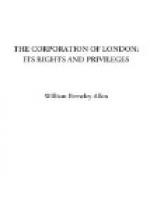Two remarkable incidents marked the reign of Edward III. in connection with the City of London; the Lord Mayor was now constituted, by royal charter, one of the judges of oyer and terminer and gaol-delivery at Newgate. The ancient trading gilds also became developed into the present livery companies, so called, because a peculiar uniform was chosen by each. They were then likewise denominated crafts or mysteries, their president being styled a warden; the title of alderman being now reserved for the chief magistrates of wards. It may, too, be worthy of note that, in the 28th year of this reign the city serjeants received permission, when engaged in their official duties, and on great ceremonial occasions, to bear maces of gold or silver, with the royal or other arms thereon. We are told that this was considered a most flattering distinction, and that the mace-bearer, by virtue of his office, was deemed an esquire.
So gladly did our valiant and victorious kings of the olden times avail themselves of every opportunity to do honour to the liberality, courage, and fidelity of the wealthy and intelligent burgesses of London.
After various unsuccessful attempts to establish a representative form of government, it was at length decided, in the seventh year of Richard II., at a special convocation of the whole community of citizens, that there should be both a deliberative and an elective assembly. The latter, of course, consisted of the aggregate body of citizens, anciently designated immensa communitas, or folkmote, who were annually to elect four persons at the wardmote for each ward to represent the commonalty on all occasions of a deliberative nature. During the early part of this reign the City of London had no reason to complain of any lack of royal favour. Afterwards, however, Richard was guilty of many attempts at extortion, and even seized upon the franchises of the City, on the pretext of a riot, notwithstanding that the first charter of his grandfather, Edward III., had debarred such forfeiture as the consequence of individual misconduct. These acts of oppression very naturally and justly alienated the attachment of the Londoners, and prepared them to give a hearty welcome to Bolingbroke. This good-feeling was maintained throughout the reign of Henry IV., who testified his gratitude by the grant of several valuable privileges. A like cordial understanding between the citizens and their sovereign existed under Henry V., and the City, in consequence, increased in opulence, population, and influence. Guildhall was built, and the streets were lighted at night by public lanterns. The halcyon days, however, of the City of London must be referred to the reign of the fourth Edward. The citizens never wavered in their attachment to his fortunes, nor did that gay and gallant monarch ever exhibit any coldness of feeling—at least, towards their fair dames. Of Richard III. it is unnecessary to speak, and even of Henry VII there is little to be said, save that he never omitted an opportunity of fleecing the citizens and replenishing his exchequer.




